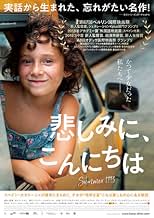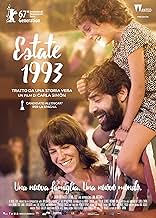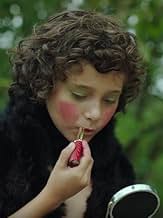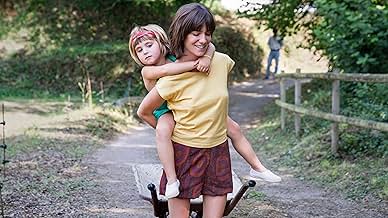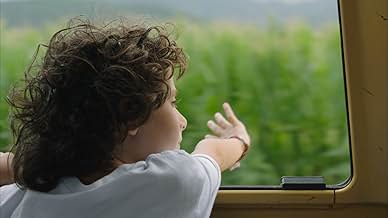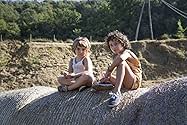AVALIAÇÃO DA IMDb
7,1/10
8,8 mil
SUA AVALIAÇÃO
Adicionar um enredo no seu idiomaAfter her mother's death, six-year-old Frida is sent to her uncle's family to live with them in the countryside. But Frida finds it hard to forget her mother and adapt to her new life.After her mother's death, six-year-old Frida is sent to her uncle's family to live with them in the countryside. But Frida finds it hard to forget her mother and adapt to her new life.After her mother's death, six-year-old Frida is sent to her uncle's family to live with them in the countryside. But Frida finds it hard to forget her mother and adapt to her new life.
- Direção
- Roteirista
- Artistas
- Prêmios
- 38 vitórias e 58 indicações no total
Paula Blanco Barnés
- Cesca
- (as Paula Blanco)
Dolores Fortis
- Carnissera
- (as Dolors Fortis Artacho)
Tere Solà
- Senyora Carnisseria
- (as Tere Solà Nasarre)
Josep Torrent
- Doctor
- (as Josep Torrent Alabau)
Cristina Matas
- Infermera
- (as Cristina Matas Calvet)
Avaliações em destaque
Boxes are stacked in the living room of six-year-old Frida's (Laia Artigas) house as she prepares to go and live with her Uncle Esteve (David Verdaguer, "Anchor and Hope") and Aunt Marga (Bruna Cusi, "Uncertain Glory") after the death of her mother. Spain's submission for Best Foreign Film at the 2018 Oscars, director Carla Simón's autobiographical Summer 1993 (Estiu 1993) is a sensitive and nuanced hymn to childhood whose magic is interrupted by the sudden dark intrusions of the adult world. As the foundations of six-year-old Frida's belief in the world as a safe place are shattered, she must come to terms with living with a new set of parents in a rural Catalan village far removed from the city of Barcelona in which she grew up.
Calling on her childhood recollections, Simón's film consists of vignettes focusing on Frida's ability to adjust to her profoundly changed life. The relationship between Frida and her three-year-old cousin Anna (Paula Robles) alternates between the joy of spontaneous play, and Frida's acting out her grief in ways that threaten Anna's well being. From having fun playing in the bathtub to play acting as grown-ups and to joining a local Basque Carnival, the performances are so natural that they seem improvised. Though Esteve and Marga are warm people who are generous in their love, Frida is tentative and withdrawn. A visit to a doctor for testing show their concern about Frida carrying the AIDS virus (which it is hinted her mother died from), but the significance of the visit does not register on the child.
Emotions bubbling beneath the surface do not appear until a visit by Frida's grandparents Avi and Avia (Fermí Reixach, "Night and Day," TV series and Isabel Rocatti, "El dia de mañana," TV series). Prompted by her grandmother's focus on praying, Frida sneaks out of the house at night to leave gifts for her mother in the woods near the statue of the Virgin Mary, but confides in no one. The grandparent's visit is traumatic for Frida, however. Despite their disparaging comments about their daughter's lifestyle expressed in Frida's presence, she desperately wants to go home with them and has to be physically restrained by her uncle. As her anger begins to surface, Frida uses Anna as a target of her distress, telling her cousin that she has so many dolls because her parents loved her so much.
She also encourages Anna to jump into a pool with her even though she knows the water is above her head. In an even scarier incident, Frida leaves Anna by herself in the woods, telling her to wait there until she comes back. When she doesn't return, Marga panics while Anna falls and breaks her arm causing Marga to say that Frida is used to getting her own way and needs greater discipline, telling Esteve, "That girl has no morals." Having overheard the conversation, Frida decides to run away, heartbreakingly telling Anna that "no one loves me here." Led by Artigas' remarkably expressive performance, Simón guides the film to its stunning conclusion with a sure hand that avoids sentimentality, relying only on the resilience of childhood innocence and the impeccable strength of love to achieve its results.
Calling on her childhood recollections, Simón's film consists of vignettes focusing on Frida's ability to adjust to her profoundly changed life. The relationship between Frida and her three-year-old cousin Anna (Paula Robles) alternates between the joy of spontaneous play, and Frida's acting out her grief in ways that threaten Anna's well being. From having fun playing in the bathtub to play acting as grown-ups and to joining a local Basque Carnival, the performances are so natural that they seem improvised. Though Esteve and Marga are warm people who are generous in their love, Frida is tentative and withdrawn. A visit to a doctor for testing show their concern about Frida carrying the AIDS virus (which it is hinted her mother died from), but the significance of the visit does not register on the child.
Emotions bubbling beneath the surface do not appear until a visit by Frida's grandparents Avi and Avia (Fermí Reixach, "Night and Day," TV series and Isabel Rocatti, "El dia de mañana," TV series). Prompted by her grandmother's focus on praying, Frida sneaks out of the house at night to leave gifts for her mother in the woods near the statue of the Virgin Mary, but confides in no one. The grandparent's visit is traumatic for Frida, however. Despite their disparaging comments about their daughter's lifestyle expressed in Frida's presence, she desperately wants to go home with them and has to be physically restrained by her uncle. As her anger begins to surface, Frida uses Anna as a target of her distress, telling her cousin that she has so many dolls because her parents loved her so much.
She also encourages Anna to jump into a pool with her even though she knows the water is above her head. In an even scarier incident, Frida leaves Anna by herself in the woods, telling her to wait there until she comes back. When she doesn't return, Marga panics while Anna falls and breaks her arm causing Marga to say that Frida is used to getting her own way and needs greater discipline, telling Esteve, "That girl has no morals." Having overheard the conversation, Frida decides to run away, heartbreakingly telling Anna that "no one loves me here." Led by Artigas' remarkably expressive performance, Simón guides the film to its stunning conclusion with a sure hand that avoids sentimentality, relying only on the resilience of childhood innocence and the impeccable strength of love to achieve its results.
In the wake of tragedy it's pretty impossible to try and move on and forget your loss, imagine doing that if you were six years old and had no immediate family left. That's the story of Summer 1993, as a young Frida spends a summer in countryside Spain with her Aunt as assimilation becomes a grand task for a grieving young one. Both subtly heartbreaking and beautiful, Summer 1993 finds a unique voice with a young girl (semi-autobiographical from director Carla Simon) as she navigates a new life that will either break her or make her stronger.
7.1/10
7.1/10
It's really sad & not promising for humanity when people view a magnificent film like this & call it boring. It shows how our society, & especially school & the unconscionable entertainment industry, cater to the lowest levels of human nature, ignoring the pain, the love, & the good that we have but often don't know how to share or express.
Films like this can provide a genuine education at any level, with teachers serving as discussion leaders to help children express their pain, deal with their fears, & learn to appreciate one another while dealing with their differences & becoming supportive rather than competing, dominating, or constantly defeating one another as the morally bankrupt western civilization teaches them now.
Films like this can provide a genuine education at any level, with teachers serving as discussion leaders to help children express their pain, deal with their fears, & learn to appreciate one another while dealing with their differences & becoming supportive rather than competing, dominating, or constantly defeating one another as the morally bankrupt western civilization teaches them now.
Very delicate Catalan movie about an orphan girl whom an uncle and his wife take care of, together with the child's cousin. Although living with a good family who gives her love, she suffers, is jealous about the other girl, lies and has michievous attitide, feels revolted. Not action-oriented, the story is however deep in dealing with all feelings involved, and all actors are very convincing, inclusing the children. As the movies advances we know a little more about the girl's mother. It is also an excelent film about being a child. Worth watching.
This is the story of a little girl from Barcelona who is adopted by her aunt's family in the countryside, after her mother passes away. Largely autobiographical, "Summer 1993" is filmed in a very naturalistic style and almost feels like a documentary. The director, Carla Simón, pays special attention to the kind of small details that can make a big difference to a young kid. Although not very much seems to be going on in the surface, one can see that a very important drama, charged with intense emotions, is going on deep in the lives of this little person and the family that has welcomed her. The acting is all very effective and particularly Laia Artigas, who plays the main character, is surprisingly strong and charismatic for someone her age.
"Summer 1993" is one of many Spanish films that observe the world through the eyes of a child. Other examples include the classics "Cría Cuervos", "The Spirit of the Beehive" and "El Sur". The contemplative gaze and relatively slow pace remind me of "En Construcción", a documentary by another Catalan filmmaker, José Luis Guerín.
"Summer 1993" is one of many Spanish films that observe the world through the eyes of a child. Other examples include the classics "Cría Cuervos", "The Spirit of the Beehive" and "El Sur". The contemplative gaze and relatively slow pace remind me of "En Construcción", a documentary by another Catalan filmmaker, José Luis Guerín.
Você sabia?
- CuriosidadesLaia Artigas and Paula Robles were cast for Frida and Anna respectively because they displayed a power struggle relationship during the casting process.
- ConexõesFeatures El retorno de D'Artacan (1990)
- Trilhas sonorasToma mucha fruta
Written by Chop Suey (as Cesar Sala Garcia) and David Pallol Font
Performed by Bom Bom Chip
Principais escolhas
Faça login para avaliar e ver a lista de recomendações personalizadas
- How long is Summer 1993?Fornecido pela Alexa
Detalhes
- Data de lançamento
- País de origem
- Central de atendimento oficial
- Idioma
- Também conhecido como
- Summer 1993
- Locações de filme
- Empresas de produção
- Consulte mais créditos da empresa na IMDbPro
Bilheteria
- Orçamento
- € 960.000 (estimativa)
- Faturamento bruto nos EUA e Canadá
- US$ 185.903
- Fim de semana de estreia nos EUA e Canadá
- US$ 21.307
- 27 de mai. de 2018
- Faturamento bruto mundial
- US$ 3.031.379
- Tempo de duração1 hora 37 minutos
- Cor
- Mixagem de som
- Proporção
- 1.85 : 1
Contribua para esta página
Sugerir uma alteração ou adicionar conteúdo ausente



